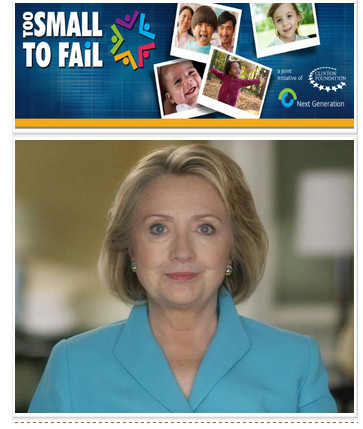Op-Ed from Hillary Clinton: Closing the "Word Gap"
 Hillary Clinton
Hillary Clinton
Nourishing a child’s mind in the first five years of life
is as essential as feeding her body. New scientific research confirms
that what happens to children’s brains in their earliest years shapes
the adults they become, the success they achieve, and the contributions
they make to our economy and society. Unfortunately, too many of our
kids today are not getting the nourishment they need.
Researchers have identified what they’re calling a “word gap.” Many
children who grow up in low-income families enter school with
substantially smaller vocabularies than their classmates. And this
disadvantage leads to further disparities in achievement and success
over time, from academic performance and persistence to earnings and
family stability even 20 and 30 years later.
Coming to school without words is like coming to school without food
or adequate health care. It makes it harder for kids to develop their
creativity and imagination, to learn, excel, and live up to their full
potential. It should spur us to action just like child hunger and child
poverty.
Why is this happening?
We know that children build their vocabulary by listening to and
interacting with their parents and caregivers. But millions of American
parents, especially those struggling to make ends meet or without strong
support networks, end up talking and reading to their babies much less
frequently than in more affluent families. Many parents just don’t have
time, between multiple jobs and significant economic pressures, or don’t
realize how important this really is.
Studies have found that by age four, children in middle and upper
class families hear 15 million more words than children in working-class
families, and 30 million more words than children in families on
welfare. This disparity in hearing words from parents and caregivers
translates directly into a disparity in learning words. And that puts
our children born with the fewest advantages even further behind. Among
those born in 2001, only 48 percent of poor children started school
ready to learn, compared to 75 percent of children from middle-income
families.
The “word gap” is a significant but solvable challenge. We know that
it’s possible to help parents and communities make small changes that
have a big impact on our kids, whether it’s teaching parents about the
importance of vaccinations and regular check-ups, or putting babies down
to sleep on their backs to prevent sudden infant death syndrome.
Efforts like the Providence Talks project in Rhode Island and the Thirty
Million Words Project in Chicago are already experimenting with new
approaches to close the “word gap.”
I have been an advocate for early childhood development for my entire
adult life, ever since I was a young law student working at the Yale
Child Study Center. And the more I learn about the new research in the
field, the more I am convinced that this is an issue vital to the future
competitiveness of our country, the strength of our families, and the
health of our communities. That’s why I’ve made early childhood
development a major focus of my new work at the Bill, Hillary &
Chelsea Clinton Foundation.
In partnership with an innovative non-profit in San Francisco called
Next Generation, we’ve launched a campaign called “Too Small to Fail.”
Our first goal is to address the biggest obstacles standing in the way
of parents talking, reading, and interacting with their children – a
lack of awareness and a lack of time.
Research suggests that how much parents know about the importance of
having quality interactions with their babies matters even more than
their income or educational attainment. If they start to view reading a
bedtime story as just as important as changing a diaper, then they’ll
find a way to do it. To help spread the word, Too Small to Fail will
conduct a public action campaign to give parents the information they
need.
Of course, there are only so many hours in the day. Parents in low
income families, especially those who struggle to work two jobs with few
benefits or flexibility, face enormous pressures on their time and
attention. So Too Small to Fail will work with employers and the
business community to encourage them to give parents more flexibility
and support, just as the Clinton Foundation has previously worked with
the private sector to lower the cost of AIDS drugs in Africa and the
calorie count of snack foods in American schools.
We hope that by moving forward on both these tracks, we can help more
parents and care-givers give our kids the start they deserve. As a
first step, we are releasing a strategic roadmap that lays out the
research behind Too Small to Fail and the agenda ahead of it. I hope
you’ll take a look and share it with your friends and neighbors. We’re
all in this together, after all, and we all have an opportunity to be
part of the solution.
Americans have always believed that, at our best, we’re a land of
equal opportunity; that it doesn’t matter where you come from or who
your parents were – you should have the same chance as anyone else to
live up to your full God-given potential. Closing the “word gap” will
help reduce the inequality in our society and restore a sense of
mobility and possibility to American families. All our kids deserve the
chance to start life on an equal playing field. They’re too small to
fail, so let’s help them succeed. Please join us at toosmall.org.
As a mom, I made reading to a priority every night. New studies show us the importance of words:


 Hillary Clinton
Hillary Clinton Hillary Clinton
Hillary Clinton